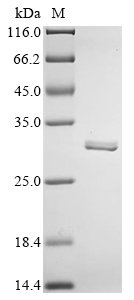Recombinant Rat Carbonic anhydrase 2 (Ca2)
CAT:
399-CSB-YP004370RA-02
Size:
100 µg
Price:
Ask
- Availability: 24/48H Stock Items & 2 to 6 Weeks non Stock Items.
- Dry Ice Shipment: No




Recombinant Rat Carbonic anhydrase 2 (Ca2)
- CAS Number: 9000-83-3
- Gene Name: Ca2
- UniProt: P27139
- Expression Region: 2-260aa
- Organism: Rattus norvegicus
- Target Sequence: SHHWGYSKSNGPENWHKEFPIANGDRQSPVDIDTGTAQHDPSLQPLLICYDKVASKSIVNNGHSFNVEFDDSQDFAVLKEGPLSGSYRLIQFHFHWGSSDGQGSEHTVNKKKYAAELHLVHWNTKYGDFGKAVQHPDGLAVLGIFLKIGPASQGLQKITEALHSIKTKGKRAAFANFDPCSLLPGNLDYWTYPGSLTTPPLLECVTWIVLKEPITVSSEQMSHFRKLNFNSEGEAEELMVDNWRPAQPLKNRKIKASFK
- Tag: C-terminal 6xHis-tagged
- Source: Yeast
- Field of Research: Cardiovascular
- Assay Type: Developed Protein
- Relevance: Essential for bone resorption and osteoclast differentiation. Reversible hydration of carbon dioxide. Contributes to intracellular pH regulation in the duodenal upper villous epithelium during proton-coupled peptide absorption. Stimulates the chloride-bicarbonate exchange activity of SLC26A6.
- Purity: Greater than 90% as determined by SDS-PAGE.
- Activity: Not Test
- Length: Full Length of Mature Protein
- Form: Liquid or Lyophilized powder
- Buffer: If the delivery form is liquid, the default storage buffer is Tris/PBS-based buffer, 5%-50% glycerol. If the delivery form is lyophilized powder, the buffer before lyophilization is Tris/PBS-based buffer, 6% Trehalose, pH 8.0.
- Reconstitution: We recommend that this vial be briefly centrifuged prior to opening to bring the contents to the bottom. Please reconstitute protein in deionized sterile water to a concentration of 0.1-1.0 mg/mL.We recommend to add 5-50% of glycerol (final concentration) and aliquot for long-term storage at -20℃/-80℃. Our default final concentration of glycerol is 50%. Customers could use it as reference.
- Molecular Weight: 30.5 kDa
- References & Citations: "Carbonic anhydrase II plays a major role in osteoclast differentiation and bone resorption by effecting the steady state intracellular pH and Ca2+." Lehenkari P., Hentunen T.A., Laitala-Leinonen T., Tuukkanen J., Vaeaenaenen H.K. Exp. Cell Res. 242:128-137 (1998)
- Storage Conditions: The shelf life is related to many factors, storage state, buffer ingredients, storage temperature and the stability of the protein itself. Generally, the shelf life of liquid form is 6 months at -20℃/-80℃. The shelf life of lyophilized form is 12 months at -20℃/-80℃.
